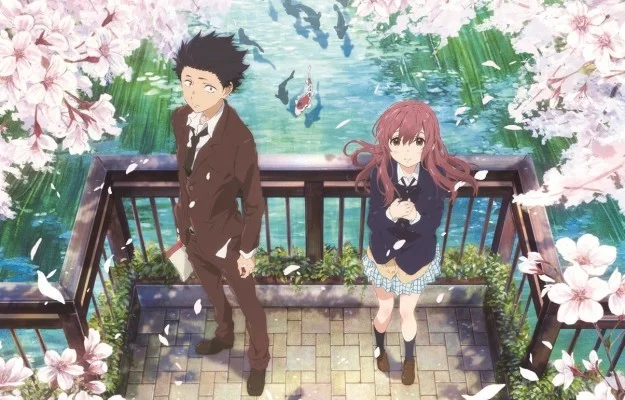MP Eri Saito, with a copy of the manga version of A Silent Voice.
Silence Is Golden: A Silent Voice, Discussed By Someone Who Lived It.
by Michelle "Ms. Geek" Klein-Hass
In Japan, there is a saying: "The Nail That Sticks Up Gets Hammered Down." In particular, anyone who's in school and differs even slightly from the norm usually gets bullied. Ijime, which is the Japanese word for bullying, is epidemic in Japanese schools. It's a problem that is a lot more minimized there than in the US, where there are attempts to intervene. Bullying is considered to be part of growing up in Japan. It's considered something that "toughens" kids, makes them more resilient. But this ignores the often silent casualties of ijime: the people who leave school, never to return, and become Hikikomori; the socially withdrawn people who live "loner" lives in school and internalize the abuse; and youth suicides.
When you are born with a disability, or when you become disabled in early childhood, being bullied by your peer group is often something to be expected. Japanese MP Eri Saito (Kita Ward of Tokyo) became deaf because of a meningitis infection acquired at only a year old. Ms. Saito grew up in regular schools, and suffered a bit of this ijime during her school days. She, however, considered the treatment she got fairly mild by comparison to the treatment other students got. Ms. Saito came to public notice after she wrote a book about her experiences as a deaf woman working in Hostess Clubs. The book became a TV drama, and propelled her into being a public figure.
A Silent Voice (Koe no Katachi) anime feature poster.
Buzzfeed Japan asked Ms. Saito to review the anime feature A Silent Voice, which features a deaf girl who suffered ijime in elementary school, and the young man who wishes to contact the girl after feeling guilty about his part in the bullying. She was happy to oblige, and went to one of the handful of screenings of the film that included open captioning for the hearing impaired.
MP Saito at the movies with her daughter.
“I strongly feel this is a film that should be seen by educators and children,” Ms. Saito said after a screening of the film, "not just to gain a better understanding of deafness, but to help reduce bullying," she added.
“The characters really leave a strong impression,” she said.
Ms. Saito's only regret was that the open captioning was not annotated with kana for young children who are only learning Kanji.
The isolated life of a deaf girl in a mainstream Japanese High School.
A Silent Voice was able to reach #2 on the Japanese Box Office charts in its first week, although the Makoto Shinkai anime feature your name. proved impossible to beat. This is not surprising considering that it is the first anime feature since The Wind Rises to earn over 10 billion Yen, and the first that is not a Studio Ghibli film.
The manga is licensed in the US by Kodansha USA, and it is unclear if the anime feature will be picked up by an distributor in the US and Canada.
Sources:
https://www.buzzfeed.com/takumiharimaya/koenokatachi-movie?utm_term=.qkYZGArzZ7
http://www.nippon.com/en/currents/d00054/
https://thisjapaneselife.org/2013/06/12/japan-ijime-bullies/
http://www.cnn.com/2015/09/01/asia/japan-teen-suicides/
https://en.wikipedia.org/wiki/Hikikomori
http://www.animenewsnetwork.com/encyclopedia/anime.php?id=16661
Can a former bully find love with one who was once a target of his abuse? Therein hangs a tale.







